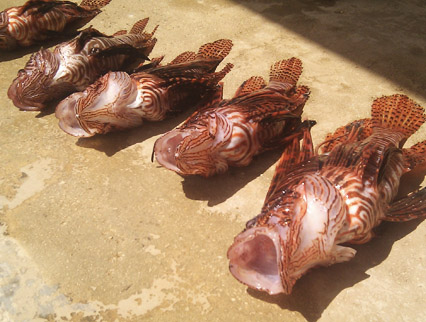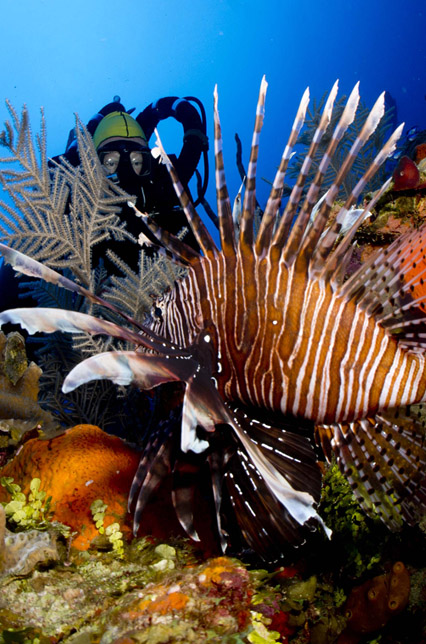
protect the seas
The people of the Cayman Islands understand the importance of maintaining a healthy underwater environment and have taken great care to preserve the treasures of the deep for future generations. The healthy reefs and clear waters make Cayman a wonderful place to visit and partake in different watersports. From technical diving to paddling along the surface of the water there is no better place to be.
There are strict laws and regulations which are designed to protect the quality of water and the creatures that inhabit them.
Summary of marine conservation laws:
Lobster
- Closed season: 1 March through 30 November. No one may take lobster from Cayman waters during these months. No one may purchase, receive or possess lobster taken from Cayman waters during these months.
- Size limit: Six inch tail minimum size.
- Catch limit: Three per person or six per boat per day, whichever is less
- Only spiny lobster (P. argus) may be taken.
Conch
- Closed season: 1 May through 31 October. No one may take conch from Cayman waters during these months. No one may purchase, receive or possess conch taken from Cayman waters during these months.
- Catch limit: Five per person or ten per boat per day, whichever is less
- No one may purchase or receive more than five conch from Cayman waters in any one day.
Whelks
- Closed season: 1 May through 31 October. No one may take whelk from Cayman waters during these months. No one may purchase, receive or possess whelk taken from Cayman waters during these months
- Catch limit: Two-and-a-half gallons in the shell or twoand- a-half pounds of processed whelks per person per day.
- No one may purchase or receive more than two-and-ahalf gallons in the shell or two-and-a-half pounds processed whelks from Cayman waters in any one day.
- Chitons, periwinkles and bleeding teeth may not be taken from Cayman waters at any time.
Echinoderms
- Echinoderms (includes starfish, sea eggs/urchins, sea cucumber, sand dollars etc) may not be taken from Cayman waters at any time.
Turtle
- No one may disturb, molest or take turtle in Cayman waters without a License from the Cayman Marine Conservation Board
- Possession of turtle eggs is prohibited
- For licensed fishermen, closed season is May 1 through October 31.
Sharks
- No one may feed, attempt to feed or provide or use food to attract any shark in Cayman waters.
Nassau Groupers
- Size limit: Twelve inch minimum size limit applies throughout Cayman waters year round EXCEPT:
- Designated Grouper Spawning Areas are protected.
- No one may take Nassau grouper from any of the Designated Grouper Spawning Areas.
- No one may spearfish or set a fish-pot within a one– mile radius of any Designated Grouper Spawning Area from 1 November through 31 March.
Other Fish
- Protected fish: Jew fish, tilefish (whities), filefish (pipers) and angelfish, including Grey, French and Queen angels (old monks), may not be taken from Cayman waters at any time.
- Size limit: Eight-inch minimum size on all other fish except goggle eyes, herrings (including sprats), anchovies and silversides (including loggerhead and fine fry).
Fish Pots
- Must be licensed by the Marine Conservation Board
- Only Caymanians over 18 may be granted licences.
- Must be identified with a DOE tag.
- No fish pot may be set within a one–mile radius of any Designated Grouper Spawning Area from 1 November through 31 March.
Spear Guns and Seine Nets
- No one may use a speargun (includes Hawaiian sling, polespear, harpoon, hookstick or any device with a pointed end which may be used to impale, stab or pierce any marine life but does not include a striker) or seine net without a licence from the Marine Conservation Board. NOTE: A striker is defined as a wooden pole, no shorter than 10 feet, with a maximum of 2 barb-less prongs attached to one end.
- No one may possess a speargun without a licence.
- No one may import a speargun or any parts for a speargun.
- Only Caymanians over 18 may be granted licences.
- Speargun catch limit: Three fish per licensed person per day.
- No one may possess more than six fish that have been caught by a speargun.
- No one may spearfish within a one–mile radius of any Designated Grouper Spawning Area from 1 November through 31 March.
- Licence holders must carry licence when using seine net or spear fishing and adhere to licence conditions.
Fishing Licenses
- Unless licensed by the Marine Conservation Board, residents who do NOT possess Caymanian Status may not take or attempt to take, by any means, any marine life while he is on shore or in any part of Cayman waters in which he can stand.
- No licence is required for catch and release fishing.
General Rules
- Damaging coral by anchor, chains or any other means anywhere in Cayman waters is prohibited
- No taking of any marine life alive or dead while on scuba.
- No taking of any coral, sponges, etc. from Cayman waters
- Export of live fish or other marine life is prohibited
- Fishing with gill nets, poison or other noxious substances is prohibited
- Dumping anything in Cayman waters is prohibited
- The export of conch shells and or black coral requires a CITES permit, issued through the DOE.
Penalties
Violation of these laws is an offence carrying a maximum penalty of CI$500,000.00 fine and one year in jail. Upon conviction, forfeiture of the vessel or other equipment may also be ordered.
Call for further information
Department of Environment
580 North Sound Way, Grand Cayman.
Phone: 949-8469
Fax: 949-4020
Cayman Brac: 926-0136
Little Cayman: 926-0135
VHF: Channel 17
Report offences to VHF 17, 948-6002 or 911
Report oil spills or other marine pollution to the DOE 949-8469 or 911
EMAIL: doe@gov.ky
.jpg)


